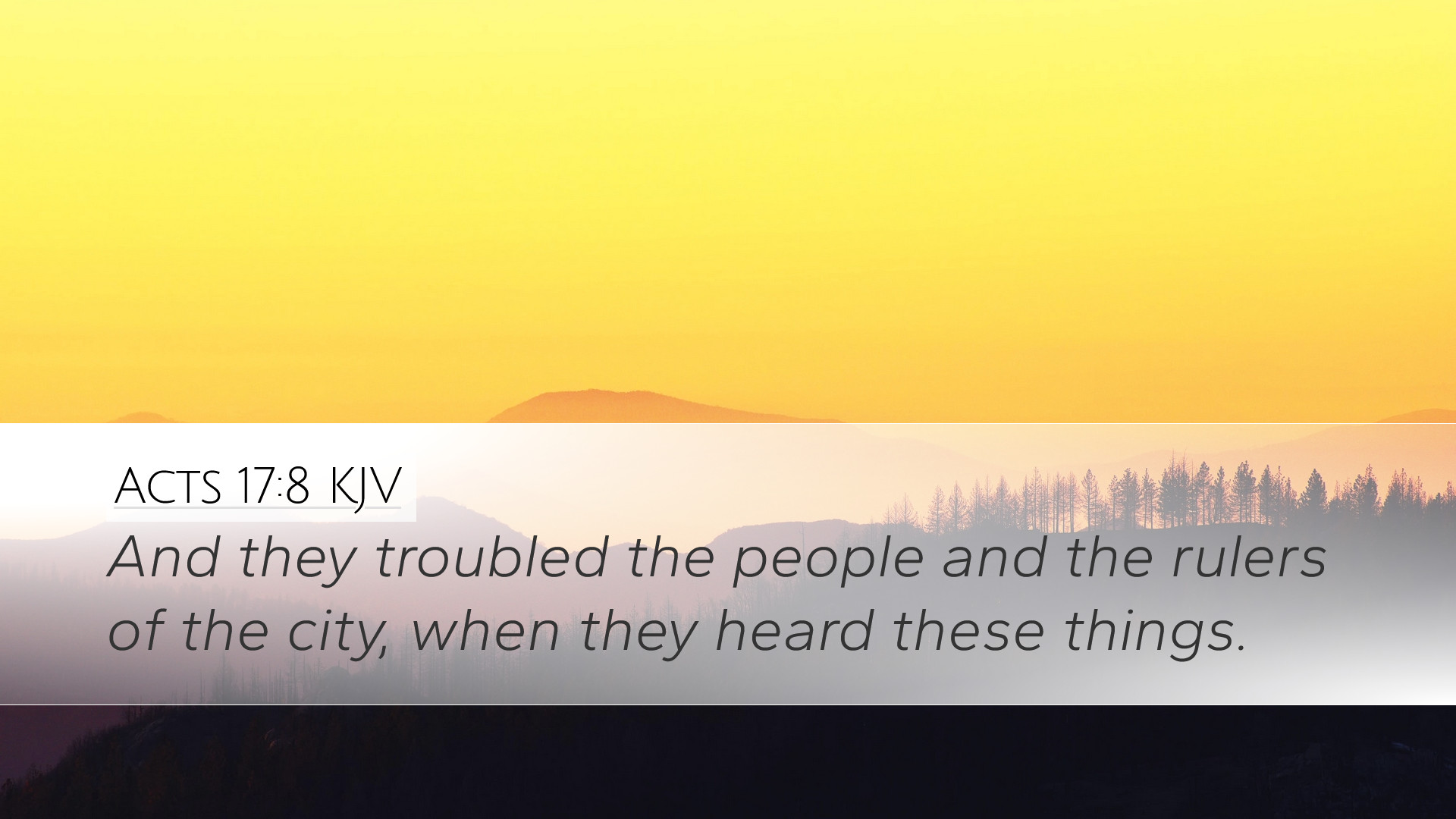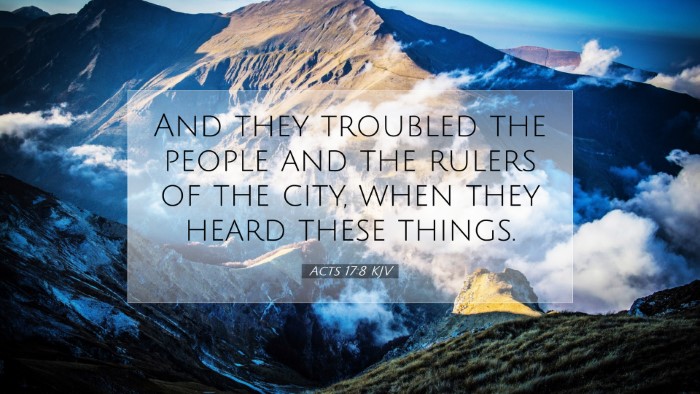Commentary on Acts 17:8
Verse: "And they troubled the people and the rulers of the city, when they heard these things." (Acts 17:8)
Overview
This verse occurs within the backdrop of Paul and Silas’ missionary activities in Thessalonica. It highlights the tumult caused by their preaching, which brings to light the potential conflicts between the Christian message and prevailing societal norms. The reactions of the people and authorities reveal the deeper implications of the Gospel's penetration into a culture steeped in traditions opposed to the radical truths of Christianity.
Commentary Insights
1. Matthew Henry's Perspective
Matthew Henry emphasizes the disturbance that the preaching of the Gospel creates in the hearts of the unconverted. The phrase "troubled the people" signifies not merely a physical uproar but a moral and spiritual upheaval. Henry notes that the Gospel confronts individuals and communities with the truth of God, often leading to societal unrest.
- Conversion vs. Culture: Henry draws attention to the clash between culture and conversion; as the message of salvation is proclaimed, those resistant to it feel threatened and react. This reflects the timeless friction when the light of Christ penetrates the darkness of cultural values.
- Opposition from Authority: Henry highlights the role of local rulers who, fearing a disturbance of the peace or a challenge to their authority, aligned with the populace's agitation against the apostles. This alignment of political and social forces against the Gospel is a recurrent theme in the Book of Acts.
2. Albert Barnes’ Interpretation
Albert Barnes provides a detailed examination of the societal implications of Paul and Silas's ministry in Thessalonica. He explains how the reaction to their message reflects a broader apprehension towards theological innovations which threaten established religious and societal structures.
- Civil Disobedience: Barnes notes that in cases where the Gospel conflicts with civil ordinances or societal norms, Christians must navigate these waters carefully. The trouble in the city echoes the struggles that Christians face when their beliefs encounter societal hostility.
- Responses to Truth: He also speaks to how truth itself can provoke unrest; those who hear the Gospel message are often left with a choice that can lead to deep inner conflict and, outwardly, societal turmoil.
3. Adam Clarke's Viewpoint
Adam Clarke's commentary adds an insightful socio-political dimension to the analysis of Acts 17:8. He points out that the people of Thessalonica were deeply invested in their existing cultural and religious systems, resulting in resistance to the new teachings about Jesus Christ.
- Religious Tolerance: Clarke posits that the trouble stirred was a reflection of a lack of religious tolerance; the novelty of the Christian faith challenged the status quo, and those in power viewed this as a threat to their authority.
- The Nature of Spiritual Warfare: He discusses the spiritual dimensions of such earthly conflicts, suggesting that the opposition faced by Paul and Silas was not purely political but rooted in profound spiritual struggles. The disturbance caused by the apostles signals a battle over truth that has echoed throughout history.
Theological Application
Acts 17:8 serves as a poignant reminder of the cost of discipleship and the nature of evangelistic endeavors in a hostile world. The unrest in Thessalonica illustrates that the proclamation of the Gospel is often met with resistance, which should prepare the minds and hearts of believers today.
- Embracing Adversity: Believers ought to embrace the accompanying adversities with courage, knowing that the path of sharing the Gospel may bring about tumultuous reactions.
- Understanding the Stakes: Understanding the stakes involved in evangelism is crucial; when the truth of Christ interrupts the lies of the world, it can lead to significant upheaval.
- Building Resilience: This passage encourages a resilient faith amidst challenges, as those who hold firm to the truths of the Gospel will often face opposition from society.
Conclusion
Acts 17:8 challenges both the early church and contemporary believers to reflect on the implications of the Gospel in their context. It is a call to engage with a world that may resist the revolutionary truths of Christ while also affirming that such trouble may indicate the presence of God at work.


